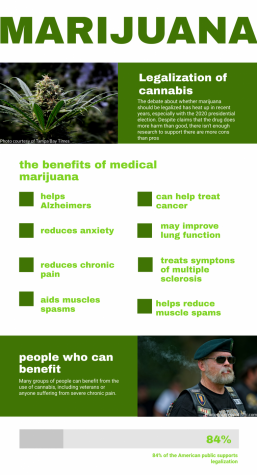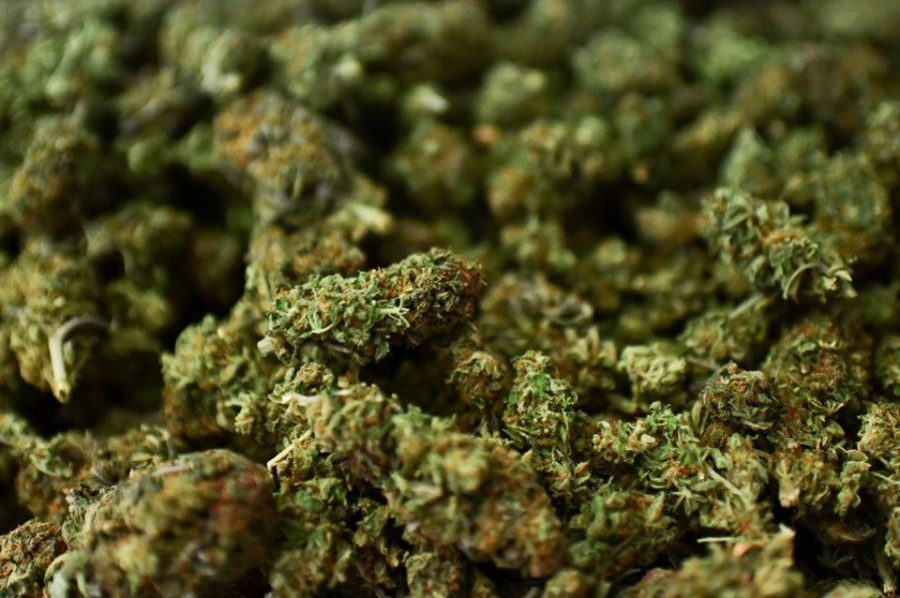Medical marijuana: Time to legalize
The medicinal benefits of the drug far outweigh the possible cons it poses to people’s health
Although there has been a long-standing debate about the legality of marijuana in the United States, it’s time to make it available for the people who need it.
November 26, 2019
The legalization of cannabis has been a polarizing topic in American politics lately, heating up especially with the 2020 presidential election. Conservatives are against the drug being used in everyday life, while liberals want it to be used to help treat medical conditions. However, 84% of the public wants the drug to be legalized for medical purposes, with 61% wanting it available for recreational use. Despite constant pushback against the legalization of marijuana, it needs to be available for those who require its medicinal benefits.
The real crux of this debate stems from a lack of research about cannabis because of its longstanding federal illegal status. Scientists have not been able to study marijuana the same way they could for alcohol or tobacco, leading to a lot of unknown information that would be crucial in deciding whether it should be legal or not.
Despite this, researchers have been able to learn about the drug slowly throughout the years.
A report from the National Academies of Sciences, Engineering and Medicines found there was strong evidence that marijuana helps with reducing chronic pain, muscle spasms, controlling treatment-resistant epileptic seizures and the symptoms of multiple sclerosis. Similarly, cannabidiol (CBD) has been shown to halt the expansion of cancer cells throughout the body along with relieving anxiety and stress. Marijuana additionally has no history of damaging the lungs of users, in fact, studies show that it may improve lung function and smokers aren’t at a greater risk to develop cancers than non-smokers.

Despite arguments that cannabis can hurt people’s health, its been shown to provide treatment for various chronic diseases and cancers.
There are a plethora of people who can benefit from cannabis use, including veterans. Despite the Department of Veterans Affairs’ argument that there is no evidence supporting medicinal marijuana assisting veterans, this stems from a lack of research because of the insane restrictions on studying the drug. Still, two-thirds of veterans say they suffer from chronic pain and they had higher rates of cancer from 2015-2016. Both of these conditions can be treated by marijuana and are a much safer alternative than opioid use, a common practice for helping treat veterans and post-traumatic stress disorder.
If there is a drug that has definitive medical benefits that can help a lot of people, it seems illogical that it would be a substance classified along with cocaine and meth. It seems insane that alcohol can have a legal status while cannabis is deemed a schedule one drug, when in fact it has less detrimental effects on the body
It is.
The constant retort to the legalization of marijuana is that it has the potential to become a gateway drug or have adverse effects on the brain later in life. Yes, anyone constantly using a drug or alcohol is putting their health at risk later in life, yet tobacco, vaping and alcohol are all legal in the United States. These arguments have a base, but again, scientists have a hard time studying the drug because of its illegal status. The only fact is that there isn’t enough research to fully support either of these theories. Of course, there are instances of marijuana users turning to “harder” drugs and having their cognitive skills lessened. However, the sample size does not represent all users because there hasn’t been sufficient research about the drug in these regards.
The fact is that marijuana has proven medical benefits that can help a lot of people, there isn’t enough research to support that it has harsh effects on health and the majority of Americans support its legalization for medicinal use. It should not be classified as a schedule one drug, nor should it even be illegal in the United States. If it were legalized, scientists could study the substance more and figure out whether or not marijuana has detrimental effects on the brain or the body. Right now, research shows that the pros outweigh the cons by a wide margin.
It’s time to legalize medical marijuana in the United States.







